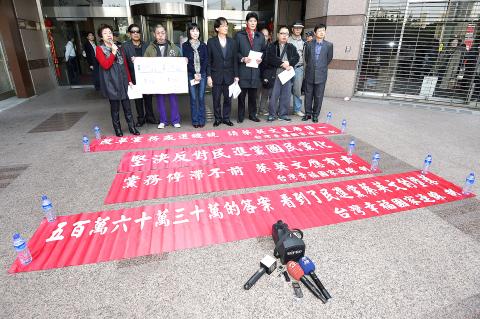A group of Democratic Progressive Party (DPP) members yesterday rallied outside party headquarters in Taipei, protesting against the newly released schedule and regulations for nominating the candidate for next year’s presidential election.
“The DPP officially released its regulations on nominating the next presidential candidate today, and the registration process for the primary begins tomorrow,” DPP member Ku Wen-fa (古文發), who organized the demonstration with about 30 DPP members as the party’s routine Central Standing Committee meeting was taking place, told reporters.
“We, as DPP members, were never consulted during the decisionmaking process, so this is a non-transparent decisionmaking process and is against the party’s core values of being ‘democratic’ and ‘progressive,’” he said.

Photo: Chen Chih-chu, Taipei Times
In addition, Ku said that whoever intends to sign up for the primary has to pay a NT$4 million (US$127,000) registration fee, plus another NT$1 million for poll surveys on support rates.
“What would you call it other than ‘money politics’?” Ku asked. “This is not what the nation’s major opposition party, which receives NT$100 million in subsidies from the government a year, should do.”
Ku said that he organized the protest not because he is against DPP Chairperson Tsai Ing-wen (蔡英文) or supports a DPP politician who plans to run against her.
“We are doing so for the good of the party,” he said.
The protesters were met by DPP Department of Social Movements Deputy Director Chen Tzu-yu (陳子瑜), who promised to refer their petition to Tsai.
“We are certainly not satisfied with the party’s response, but we will wait, and we will come back again if the party cannot give any satisfying promise in the end,” Ku said, adding that he has prepared NT$10 million in cash, and will discuss with fellow protesters to see if he should sign up for the primary himself.

Taiwanese can file complaints with the Tourism Administration to report travel agencies if their activities caused termination of a person’s citizenship, Mainland Affairs Council Minister Chiu Chui-cheng (邱垂正) said yesterday, after a podcaster highlighted a case in which a person’s citizenship was canceled for receiving a single-use Chinese passport to enter Russia. The council is aware of incidents in which people who signed up through Chinese travel agencies for tours of Russia were told they could obtain Russian visas and fast-track border clearance, Chiu told reporters on the sidelines of an event in Taipei. However, the travel agencies actually applied

Japanese footwear brand Onitsuka Tiger today issued a public apology and said it has suspended an employee amid allegations that the staff member discriminated against a Vietnamese customer at its Taipei 101 store. Posting on the social media platform Threads yesterday, a user said that an employee at the store said that “those shoes are very expensive” when her friend, who is a migrant worker from Vietnam, asked for assistance. The employee then ignored her until she asked again, to which she replied: "We don't have a size 37." The post had amassed nearly 26,000 likes and 916 comments as of this

New measures aimed at making Taiwan more attractive to foreign professionals came into effect this month, the National Development Council said yesterday. Among the changes, international students at Taiwanese universities would be able to work in Taiwan without a work permit in the two years after they graduate, explainer materials provided by the council said. In addition, foreign nationals who graduated from one of the world’s top 200 universities within the past five years can also apply for a two-year open work permit. Previously, those graduates would have needed to apply for a work permit using point-based criteria or have a Taiwanese company

The Shilin District Prosecutors’ Office yesterday indicted two Taiwanese and issued a wanted notice for Pete Liu (劉作虎), founder of Shenzhen-based smartphone manufacturer OnePlus Technology Co (萬普拉斯科技), for allegedly contravening the Act Governing Relations Between the People of the Taiwan Area and the Mainland Area (臺灣地區與大陸地區人民關係條例) by poaching 70 engineers in Taiwan. Liu allegedly traveled to Taiwan at the end of 2014 and met with a Taiwanese man surnamed Lin (林) to discuss establishing a mobile software research and development (R&D) team in Taiwan, prosecutors said. Without approval from the government, Lin, following Liu’s instructions, recruited more than 70 software